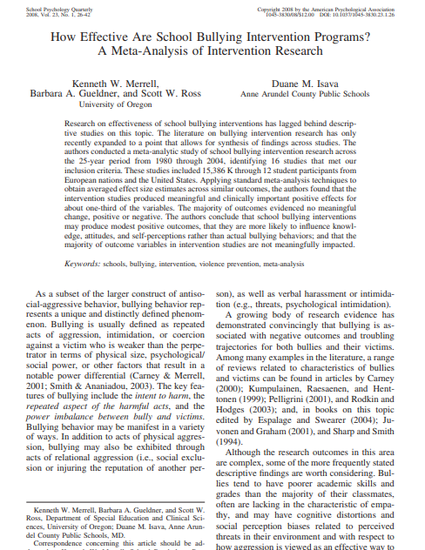
Article
How Effective Are School Bullying Intervention Programs? A Meta-Analysis of Intervention Research
School Psychology Quarterly
(2008)
Abstract
Research on effectiveness of school bullying interventions has lagged behind descriptive studies on this topic. The literature on bullying intervention research has only recently expanded to a point that allows for synthesis of findings across studies. The authors conducted a meta-analytic study of school bullying intervention research across the 25-year period from 1980 through 2004, identifying 16 studies that met our inclusion criteria. These studies included 15,386 K through 12 student participants from European nations and the United States. Applying standard meta-analysis techniques to obtain averaged effect size estimates across similar outcomes, the authors found that the intervention studies produced meaningful and clinically important positive effects for about one-third of the variables. The majority of outcomes evidenced no meaningful change, positive or negative. The authors conclude that school bullying interventions may produce modest positive outcomes; that they are more likely to influence knowledge, attitudes, and self-perceptions rather than actual bullying behaviors; and that the majority of outcome variables in intervention studies are not meaningfully impacted.
Keywords
- schools,
- bullying,
- intervention,
- violence prevention,
- meta-analysis
Disciplines
Publication Date
2008
DOI
10.1037/1045-3830.23.1.26
Citation Information
Kenneth W. Merrell, Barbara A. Gueldner, Scott W. Ross and Duane M. Isava. "How Effective Are School Bullying Intervention Programs? A Meta-Analysis of Intervention Research" School Psychology Quarterly Vol. 23 Iss. 1 (2008) p. 26 - 42 Available at: http://works.bepress.com/scott-ross/18/
